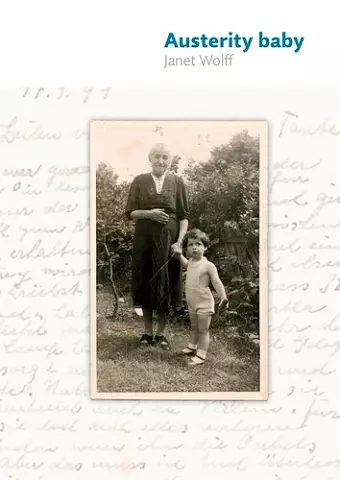Austerity Baby
Format:Paperback
Publisher:Manchester University Press
Published:22nd Jun '17
Currently unavailable, and unfortunately no date known when it will be back

Austerity Baby might best be described as an ‘oblique memoir’. Janet Wolff’s fascinating volume is a family history – but one that is digressive and consistently surprising. The central underlying and repeated themes of the book are exile and displacement; lives (and deaths) during the Third Reich; mother-daughter and sibling relationships; the generational transmission of trauma and experience; transatlantic reflections; and the struggle for creative expression.
Stories mobilised, and people encountered, in the course of the narrative include: the internment of aliens in Britain during the Second World War; cultural life in Rochester, New York, in the 1920s; the social and personal meanings of colour(s); the industrialist and philanthropist, Henry Simon of Manchester, including his relationship with the Norwegian explorer, Fridtjof Nansen; the liberal British campaigner and MP of the 1940s, Eleanor Rathbone; reflections on the lives and images of spinsters. The text is supplemented and interrupted throughout by images (photographs, paintings, facsimile documents), some of which serve to illustrate the story, others engaging indirectly with the written word.
An electronic edition of this book is freely available under a Creative Commons (CC BY-NC-ND) licence.
‘Janet Wolff ’s book is formed out of ten essays rather than chapters. Each has its own beautiful shape leading the reader from its opening gambit through a wandering exploration of unexpected elements associationally rather than logically linked to an often unexpectedly elegant reconnection with the starting point.’
Griselda Pollock, University of Leeds, New Formations
‘Ultimately, this is “a story about exile, travel and belonging” penned by a self-styled “third-generation alien”, both troubled by and proud of that status.’
Monica Bohm-Duchen, Jewish Renaissance.org.uk, October 2017
‘[Janet Wollf’s] memoir is formatted in the manner of a textbook/scrapbook; she guides her reader through a series of seemingly incongruous documents, paintings and diary extracts in the manner of a scholarly aunt turning the pages over your shoulder (possibly over a large lunch). Despite the thorniness of issues like memorialisation and racial identity, there is a certain languor in Wolff’s movement from topic to topic. And for all its obliqueness, it is Wolff’s warm tone that unifies the sometimes spuriously related stories, and makes the memoir so engaging.’
Clara Collingwood, Jewish Quarterly
ISBN: 9781526121301
Dimensions: unknown
Weight: unknown
272 pages